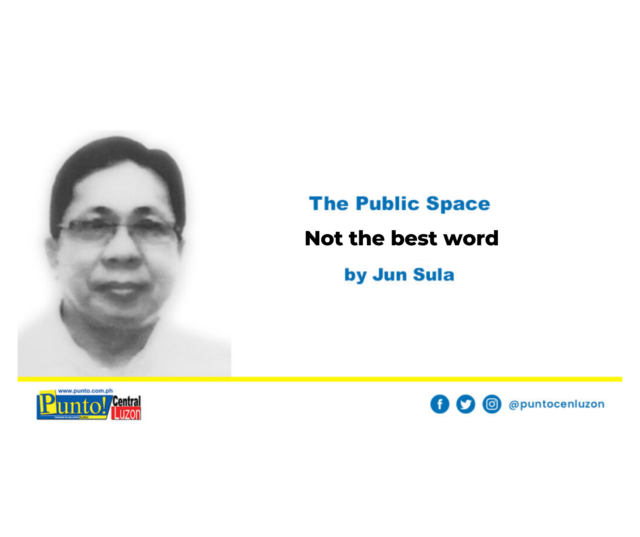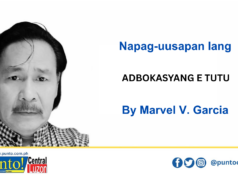It’s the worst of times; but not really that entirely bad.
It’s a good word; but not really the best, considering the times.
The problematic word is “welcome” which is not exactly a politically correct word in a time of pandemic when thousands of people get sick, people die, hundreds of thousands more lose their jobs and, based on a latest survey, millions are suffering from hunger.
Sen. Pia Cayetano, however, sees a paradox. As bad as it might have been for a lot of people, as unfortunate as it is, she expressed in a manifestation in Senate, it’s a good thing in that it unraveled something very important: the country’s health system is not really a priority and we can do much more to improve it.
To put it another way, if we can see further moving forward, health-wise, it’s the hard and costly lessons — shortcomings, failures, if you will — that COVID 19 has bared wide open before our eyes. Paradoxes, someone said, are ways to the truth. They can set us free but they are painful, the writers’ cup of tea.
Any journalist worth his salt would grab the paradox as a perfect material for writing a good story, which a national reporter did and for which Sen. Cayetano went ballistic over, accusing the writer as malicious and irresponsible.
When I was in college, I remember my journalism professor taught us how to write a good human interest stories by using such tools as paradox. One of his favorite is how one Pedro was glad he had a wooden leg when the ship he was on sank because his wooden limb saved him from drowning. Human interests are not easy to write but are a good challenge like games are to hunters.
Cayetano’s point of view was a positive and the good senator is accusing the reporter of twisting her statement to make it sound negative. Unfortunately, it was she who gave the reporter the idea. Another writer would have put the senator in a deeper semantic hole.
The problem really was her use of the word “welcome”. If it were use to describe an exclusive personal adversity, that would have been highly inspirational and encouraging. Otherwise, the use of the word “welcome” is ill-advised and misplaced. It cannot be felt but as nothing less than being insensitive to other people’s feelings.
In that sense, it’s really hard to see where malice or irresponsibility was, unless you read the writer’s mind or read between the lines to probe some personal motivation.
During the lockdown, I have been engrossed in listening to the riveting, moving accounts of Holocaust survivors on YouTube. Not a few had viewed the horrors they went through in some paradoxical wisdom that revealed how human beings can rise above the worst of adversities and become better for them. The words to describe their harrowing experiences came from their mouths, not from the others. That the difference.
Timing is also important. The pandemic is still upon us, wreaking physical, economic and social devastations among people, especially the poor and marginalized. A paradoxical view like that of Sen. Cayetano in a bad time could have the moral equivalent of a bad joke.
Two Philippine incidents cross my mind. In one, there was a hearing in the Senate when the conversation shifted to single mothers and one of the more prominent resource persons was then Secretary Taguiwalo of the Department of Social Welfare and Development. At one point, Senator Tito Sotto used the word “naano lang” in reference to their unique situation, which, of course, was widely criticized by many as very offensive and disrespectful of single mothers.
Far back in our political history, there was former Sen. Raul Manglapus who was quoted as saying that if someone is raped, she might as well enjoy it. The womenfolk were outraged by Manglapus quote, not an original, to be sure, of someone his status.
Words are powerful and carry a heavier meaning and emotional burden when they proceed from the lips of people who are supposed to know better. Noblisse oblige can be gleaned through one’s words.
One of the triggers to the French Revolution was the alleged statement of Marie Antoinette to her countrymen that if they could not have bread, they should eat cake. It was viewed as a symbol of the aristocrats and the elite’s obliviousness to the suffering of the poor French. Historical apologists have come to Antoinette’s rescue and say she didn’t say that actually.
No social upheaval in the Philippines in light of Cayetano’s paradox and no apologists either for her. Foreign Secretary Teddy Boy Locsin had already sanitized her paradox in his tweet that the pandemic was no cause for any redemption of some sort.
Statements can really be dangerous. When Henry 11 of England, frustrated by the intransigence of his good friend Thomas Becket, blurted out his wish to be rid of the latter, four of his knights took it as an order to eliminate the priest forthwith. Which they did, and Henry’s apologists say it was no order and it was just that: a spur-of-the moment frustration that, unfortunately led to murder.
In the obtaining social unrest in the United States over the death of a black man by a white police officer, President Trump is vehemently excoriated by his tweet that can only put fuel into the flame. “When the lootings start, “he tweeted,” the shootings start.” Here at home, the death of a mentally ill soldier in the hands of lockdown cop is remotely linked to an earlier statement of President Duterte to shoot unruly violators of lockdown rules as a matter of personal defense. Of course, the President’s apologists/interpreters have disabused the notion.
In Shakespeare’s Hamlet, the protagonist said that he must be cruel to be kind , that is avenging his father’s death by killing his father’s murderer and protect his mother from more harm from the culprit.
Cayetano’s welcome take on the existential crisis that stare us in the face will continue to be a good fodder for wordsmiths, speechwriters, spinmeisters and public relations professionals. The jury is still out. But it’s more likely that they will agree that it’s not probably the best word at the time by someone of her credentials.
Be sure to taste the word, advised a sage, before you spit it out.





